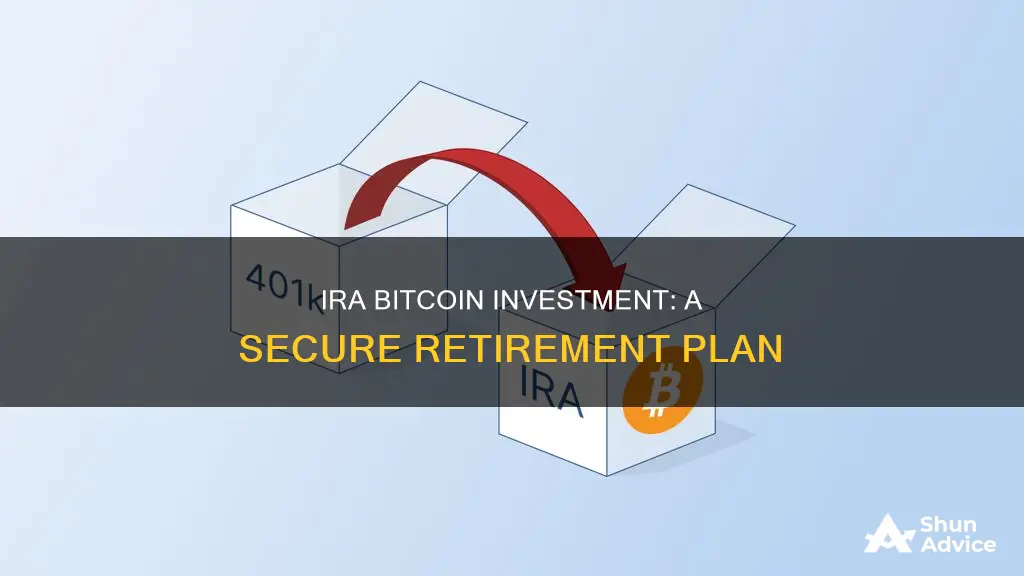
Investing in Bitcoin through an IRA is possible, but it's not a straightforward option. Since 2014, the Internal Revenue Service (IRS) has considered Bitcoin and other cryptocurrencies in retirement accounts as property, so they are taxed in the same way as stocks and bonds. This means that you can't contribute crypto directly to your IRA, but you can add it to your IRA via purchase. However, few traditional IRA providers allow this.
One option is to use a Bitcoin IRA, a self-directed IRA (SDIRA) that allows for alternative assets like cryptocurrencies. These are offered by companies including BitIRA, Equity Trust, and Bitcoin IRA. However, fees for crypto IRAs are typically much higher than for traditional IRAs, and the extreme volatility of crypto makes it a risky choice for a retirement investment.
| Characteristics | Values |
|---|---|
| How to invest | Open a self-directed IRA (SDIRA) with a custodian willing to hold crypto assets |
| Investment options | Over 60 cryptocurrencies, including Bitcoin, Ethereum, Litecoin, Stellar Lumens, Zcash, Bitcoin Cash, and Ethereum Classic |
| Tax advantages | No capital gains taxes on profitable trades; no taxes on withdrawals from a Roth IRA |
| Custodian | Examples include BitIRA, Equity Trust, and Bitcoin IRA |
| Fees | Setup, custody, trading, blockchain processing, and maintenance fees |
| Eligibility | Established a 401(k) as a full-time employee from a previous employer or are over 59.5 years old |
| Wallet | Cold storage wallet |
What You'll Learn
- Understand the risks and volatility of investing in Bitcoin through an IRA
- Learn about the different types of IRAs
- Find a custodian to help you invest in Bitcoin through your IRA
- Weigh the pros and cons of investing in Bitcoin through an IRA
- Research the fees associated with investing in Bitcoin through anIRA

Understand the risks and volatility of investing in Bitcoin through an IRA
Investing in Bitcoin through an IRA is considered high risk due to the volatility of cryptocurrencies. Bitcoin IRAs are also likely to involve additional fees and costs.
Risk and Volatility
Bitcoin investments are subject to significant price swings, which adds to their risk. For example, since 2009, the value of Bitcoin has gone from virtually nothing to around $16,000, then to nearly $75,000. This makes it unsuitable for someone approaching retirement who needs stable and liquid assets.
Cryptocurrency investors generally need to be comfortable with extreme price swings and potentially losing their entire investment. For that reason, crypto may not be the best option in a retirement portfolio.
Many cryptocurrencies are not backed by businesses or assets, so they may lose the interest of the public and investors after you purchase them. Most are only supported by the belief that they are worth something—if that belief ever wavers on a large scale, cryptocurrencies could collapse and take billions of dollars with them.
Additional Fees and Costs
Another key disadvantage of including crypto in an IRA is the fees. Crypto trading through an IRA differs from regular stock trading or trading at cryptocurrency exchanges, which are not custodians.
Because broker fiduciary duties do not bind firms offering self-directed IRA services, it is your responsibility to assess the risks associated with crypto markets and take measures to mitigate them.
Fees for crypto trading take on various forms during the investment process. They range from initial setup fees to custody, trading, or annual maintenance fees. For example, setting up a $50,000 self-directed IRA account for trading can cost several thousand dollars in charges during the initial setup, depending on the provider. There are also recurring custody and maintenance fees charged by providers of these services.
Finally, each cryptocurrency trade incurs fees from the service provider's trading partner and custodian. A typical provider may charge 3.5% per transaction per purchase and 1% or a flat fee for each sale. Additionally, you may be liable for blockchain processing fees if they're not included in the regular charges.
Special Considerations
Cryptocurrency has unique requirements, such as security or custody, which tend to bump fees up for services offered through IRA accounts. IRA custodians working with cryptocurrency must also be prepared to take on additional reporting duties with the IRS—this could translate into even more fees for cryptocurrency IRA investors.
When looking for a custodian to execute your crypto wishes, you'll find plenty of scams or fraudulent companies offering services. The U.S. Commodities Futures Trading Commission (CFTC) has warned about false crypto IRA companies claiming they had IRS approval. The Securities and Exchange Commission has also issued alerts about fraudulent cryptocurrency IRAs.
If you're in the market for a crypto IRA, it's best to speak with a certified financial advisor familiar with cryptocurrency to ensure your money is being put to its best use.
The Rise of Bitcoin: Who's Invested in the Crypto Craze?
You may want to see also

Learn about the different types of IRAs
There are several types of IRAs, each with different rules regarding eligibility, taxation, and withdrawals. Here are some of the most common types:
- Traditional IRA: This is the most common type of IRA and is available to anyone with earned income, regardless of whether they have a workplace retirement plan. Contributions may be tax-deductible, and investments grow tax-deferred. Withdrawals in retirement are taxed as ordinary income.
- Roth IRA: Contributions to a Roth IRA are made with after-tax dollars and are not tax-deductible. However, withdrawals in retirement are completely tax-free. There are income limits to contribute to a Roth IRA, but a "backdoor" method exists for high earners.
- Self-Directed IRA (SDIRA): This type of IRA allows for a broader range of investments, including real estate, commodities, and alternative assets like cryptocurrencies. It can be set up as either a traditional or Roth IRA.
- Simplified Employee Pension (SEP) IRA: A SEP IRA is a type of traditional IRA set up and funded by an employer for their employees. It has higher contribution limits than other types of IRAs, and earnings grow tax-free. Withdrawals in retirement are taxed as ordinary income.
- Savings Incentive Match Plan for Employees (SIMPLE) IRA: This type of IRA is similar to an employer-sponsored 401(k) plan and is often used by small businesses and self-employed individuals. Employees can contribute to the account, and the employer is required to make contributions as well.
Other less common types of IRAs include Spousal IRAs, which allow non-working spouses to contribute to their own IRA, and Nondeductible IRAs, which are used by individuals who don't qualify for a Roth or deductible IRA.
Dash Coin Investment Guide for Indians
You may want to see also

Find a custodian to help you invest in Bitcoin through your IRA
Investing in Bitcoin through an IRA can be a complex process, and it's important to understand the risks and potential benefits before proceeding. One key step is finding a custodian who can help you navigate the process and provide expertise in managing your IRA. Here are some things to consider when choosing a custodian to help you invest in Bitcoin through your IRA:
- Expertise and Experience: Look for a custodian with a strong track record and extensive experience in managing both traditional and alternative IRAs. They should have specific expertise in cryptocurrency trading and be able to provide guidance on the unique considerations of investing in Bitcoin.
- Security Measures: Given the volatile nature of cryptocurrencies, it's crucial to select a custodian that prioritizes security. Look for companies that offer state-of-the-art security features, such as multi-factor authentication, multi-encryption, and offline cold storage of digital assets. End-to-end insurance coverage for your digital assets is also an important factor to consider.
- Fee Structure: The cost of managing a Bitcoin IRA can be significantly higher than a traditional IRA due to the specialized nature of the investment. Be sure to understand the fee structure of the custodian, including account setup fees, transaction fees, and any ongoing maintenance or management fees. Some companies, like iTrustCapital, are known for offering competitive rates and low fees.
- Customer Service and Support: Choose a custodian that provides excellent customer service and is responsive to your needs. This includes having access to crypto IRA specialists who can guide you through the process and answer any questions you may have.
- Range of Cryptocurrencies: If you're interested in investing in cryptocurrencies beyond just Bitcoin, ensure that the custodian supports a wide range of digital assets. Some companies offer trading in a more limited number of cryptocurrencies, while others provide access to a broader selection.
- Regulatory Compliance: It's important to work with a custodian that adheres to regulatory requirements and has a good standing with relevant authorities. This can help protect your investment and ensure that your custodian acts in your best interests.
- Educational Resources: Consider selecting a custodian that offers educational tools and resources to help you make informed decisions about your investments. This can be especially beneficial if you're new to the world of cryptocurrencies.
- Reputation and Reviews: Research the reputation of the custodian and read reviews from their clients. Look for companies with a large number of positive testimonials that speak to their expertise, security, and overall customer satisfaction.
- Compatibility with Your Investment Goals: Ensure that the custodian understands your investment goals and can tailor their services to meet your specific needs. This includes helping you weigh the risks and benefits of investing in Bitcoin through your IRA.
- Transparency: Opt for a custodian that provides transparency in their fee structure, security measures, and overall operations. This can help you make a more informed decision and ensure that you're comfortable with the level of risk and the services provided.
- Bitcoin IRA: This company is one of the early leaders in the field, offering an easy account setup process, 24/7 real-time trading, and robust security features. They support trading in over 60 types of cryptocurrency and have received positive reviews for their customer service.
- BitIRA: Known for its strong security measures, BitIRA offers end-to-end insurance coverage for digital assets and offline cold storage of private keys. They require a minimum investment of $5,000 to start an IRA.
- ITrustCapital: iTrustCapital stands out for its low fees, offering some of the most affordable trading and investing rates in the industry. They provide access to a wide range of cryptocurrencies and precious metals for diversification.
- Coin IRA: Coin IRA provides educational resources and specialized cryptocurrency retirement experts to guide customers through the process. They offer low fees and secure off-balance-sheet cold storage for digital assets.
- Equity Trust: With over 40 years of experience in self-directed IRAs, Equity Trust supports both traditional and alternative investments. They offer guidance from SDIRA specialists and a range of security features to protect your investments.
Remember, investing in Bitcoin through an IRA may not be suitable for everyone. It's important to carefully consider your financial goals, risk tolerance, and the unique characteristics of the cryptocurrency market before proceeding. Conduct thorough research, seek professional advice when needed, and choose a custodian that aligns with your investment strategy and priorities.
Bill Gates' Bitcoin Investment: Did He Buy the Dip?
You may want to see also

Weigh the pros and cons of investing in Bitcoin through an IRA
Investing in Bitcoin through an IRA can be a great way to diversify your retirement portfolio and take advantage of potential tax benefits. However, it's important to carefully consider the pros and cons before making any decisions.
Pros of Investing in Bitcoin through an IRA:
- Diversification: Adding Bitcoin to your IRA can help diversify your retirement portfolio. As Bitcoin is not correlated with stocks and bonds, it can offer some protection for your retirement balance, even with its volatile prices.
- Potential Returns: While Bitcoin is highly volatile, it also offers the potential for significant gains.
- Tax Advantages: Investing in Bitcoin through an IRA can provide tax benefits. In a traditional IRA, your contributions are tax-deductible, and you'll only pay taxes upon withdrawal. With a Roth IRA, you won't owe any taxes on your investments. Additionally, buying and selling crypto within an IRA can alleviate capital gains taxes.
- Security: Bitcoin IRA providers often utilize secure storage methods, such as cold storage or multi-signature wallets, to protect your digital assets from theft.
Cons of Investing in Bitcoin through an IRA:
- Volatility: Bitcoin experiences significant price fluctuations, making it a risky investment, especially for those approaching retirement who need stable and liquid assets.
- Fees: Crypto IRAs often come with various fees, including setup fees, transaction fees, custody fees, and annual maintenance fees, which can be significantly higher than fees on crypto exchanges.
- Complexity: Investing in Bitcoin through an IRA can add complexity to your retirement planning. You'll need to carefully select a custodian and understand the additional IRS rules and regulations governing this type of account.
- Limited Investment Options: With a Bitcoin IRA, you cannot invest in traditional securities like stocks and bonds. Therefore, it's recommended to maintain at least one other account for a more diverse retirement portfolio.
- Risk of Loss: The extreme volatility of cryptocurrencies brings a significant risk of loss. The value of your investment can swing wildly, and there is a chance it may never recover.
- Lack of Regulation: Cryptocurrencies are not backed by governments or assets, and their value is based solely on investor belief. This lack of regulation and intrinsic value increases the risk of investing in Bitcoin.
Dogecoin: Long-Term Investment or Just a Meme?
You may want to see also

Research the fees associated with investing in Bitcoin through anIRA
Fees are an important consideration when deciding whether to invest in Bitcoin through an IRA. Here are some of the fees you may encounter:
Setup Fees
Some Bitcoin IRA providers charge a one-time setup fee for new accounts. This can range from $50 to several hundred dollars. For example, Bitcoin IRA charges a one-time service fee, but the specific amount is not disclosed on their website.
Annual Fees
Annual fees for Bitcoin IRAs can vary depending on the provider and the size of your account. Directed IRA, for instance, charges an annual account fee of $295. Equity Trust, on the other hand, has annual administration fees ranging from $225 to $2,250, depending on the size of the account.
Transaction Fees
Transaction fees are charged per trade and can vary significantly across providers. For instance, Directed IRA charges a trading fee of 0.50% per trade, while iTrustCapital charges a flat fee of 1% per transaction. Bitcoin IRA also charges a transaction fee, but the amount is not disclosed on their website.
Custodian Fees
Custodian fees are charged by the IRA custodian who manages your account. Bitcoin IRA, for example, charges a custodian fee, but the specific amount is not provided on their website.
Security Fees
Security fees are implemented to protect your digital assets. Bitcoin IRA, for instance, charges a security fee of 0.08% billed monthly, while BitIRA includes security measures in its end-to-end insurance coverage.
Maintenance Fees
Maintenance fees are charged for the ongoing maintenance of your account. Bitcoin IRA, for example, charges a maintenance fee, but the specific amount is not disclosed on their website.
It is important to carefully review the fee structure of any Bitcoin IRA provider you are considering. Contact their customer support or review their website for detailed information on the fees they charge. Additionally, be mindful of the volatility of cryptocurrencies and consult a financial advisor before investing.
Apple's Bitcoin Investment: Did it Happen?
You may want to see also
Frequently asked questions
You can invest in Bitcoin through your IRA by rolling over your 401(k) savings into a self-directed IRA (SDIRA) with a custodian that allows crypto assets. You can then buy Bitcoin with your IRA savings.
Investing in Bitcoin through your IRA can offer tax advantages, as well as diversifying your retirement portfolio.
The main risks of investing in Bitcoin through your IRA are the volatility of crypto assets, the high fees associated with crypto IRAs, and the potential for scams or fraudulent companies.







